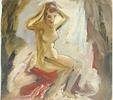Search Results, p. 13
| showing 361-390 of 11317 |
|
All books are first printings of first editions or first American editions unless otherwise noted.
CUMMINGS, E.E.
(LGBTQ)
MARTINO, Mario, with Harriet
 NY, Crown, (1977). A pseudonymously published autobiography of a former nun who transitioned from female to male in his 30s. Lower corners bumped; near fine in a very good dust jacket with several small edge chips. Offered here together with the second printing (also Crown, 1977), which is modestly foxed, else near fine in a near fine dust jacket, which adds jacket blurbs not present on the first printing; the first Canadian paperback edition (NAL/Signet, 1979, printed from U.S. sheets), which has an owner name and is very good in spine-creased wrappers, with a cover photo of "Mario" (real name: Angelo Tornabene) that does not appear in the earlier editions; and the first French edition (Trevise, 1981), which is dampstained, a good copy at best, but with two additional "after" photos not in previous editions. Essentially, the complete publication history of a landmark LGBTQ title: male-to-female transitions are, at this point, not exceptionally scarce, but female-to-male transitions still have little documentation. Quite uncommon: no copies for sale in the U.S. or U.K. at the time of this writing, in any edition.
[#035104]
$2,750
NY, Crown, (1977). A pseudonymously published autobiography of a former nun who transitioned from female to male in his 30s. Lower corners bumped; near fine in a very good dust jacket with several small edge chips. Offered here together with the second printing (also Crown, 1977), which is modestly foxed, else near fine in a near fine dust jacket, which adds jacket blurbs not present on the first printing; the first Canadian paperback edition (NAL/Signet, 1979, printed from U.S. sheets), which has an owner name and is very good in spine-creased wrappers, with a cover photo of "Mario" (real name: Angelo Tornabene) that does not appear in the earlier editions; and the first French edition (Trevise, 1981), which is dampstained, a good copy at best, but with two additional "after" photos not in previous editions. Essentially, the complete publication history of a landmark LGBTQ title: male-to-female transitions are, at this point, not exceptionally scarce, but female-to-male transitions still have little documentation. Quite uncommon: no copies for sale in the U.S. or U.K. at the time of this writing, in any edition.
[#035104]
$2,750
BUKOWSKI, Charles
 (n.p.), (n.p.), (n.d.). Typescript of two versions of "Meatball," a possibly unpublished poem by Bukowski. Signed by Bukowski, with a drawing of a boxer on page 1, and "I prefer shorter version" and a few additional pencil notes (not by Bukowski) on page 3. Five pages total, corner stapled, with Bukowski's name and address in the upper left corner of the first page. Near fine.
[#035287]
$2,500
(n.p.), (n.p.), (n.d.). Typescript of two versions of "Meatball," a possibly unpublished poem by Bukowski. Signed by Bukowski, with a drawing of a boxer on page 1, and "I prefer shorter version" and a few additional pencil notes (not by Bukowski) on page 3. Five pages total, corner stapled, with Bukowski's name and address in the upper left corner of the first page. Near fine.
[#035287]
$2,500
CAIN, James M.
 1933. An autobiographical piece about Cain's family following his father's 1903 job change from St. John's College at Annapolis to Washington College at Chestertown, MD, and the culture shock that ensued from this move to a "hick place" from one of "smartness, competence, and class," a state of affairs that was partially redeemed by the actions of "a great man" on the occasion of a Washington College-Maryland Agricultural College football game. 23 pages, carbon typescript, with approximately three dozen changes made in Cain's hand, and more than a dozen additional small variations between this text and the published version. Published in American Mercury in November 1933, the year before his first novel, The Postman Always Rings Twice (and following Our Government in 1930, nonfiction based on Cain's column for New York World). Called "one of Cain's finest essays" by David Madden in James M. Cain: Hard-Boiled Mythmaker. Carbon paper a bit yellowed, some pencil rubbing, not affecting text; near fine. An early manuscript of a boyhood epiphany by a writer who gained a place in the literary pantheon for his famous first novel, which is still considered one of the high spots of American hard-boiled fiction.
[#029577]
$2,500
1933. An autobiographical piece about Cain's family following his father's 1903 job change from St. John's College at Annapolis to Washington College at Chestertown, MD, and the culture shock that ensued from this move to a "hick place" from one of "smartness, competence, and class," a state of affairs that was partially redeemed by the actions of "a great man" on the occasion of a Washington College-Maryland Agricultural College football game. 23 pages, carbon typescript, with approximately three dozen changes made in Cain's hand, and more than a dozen additional small variations between this text and the published version. Published in American Mercury in November 1933, the year before his first novel, The Postman Always Rings Twice (and following Our Government in 1930, nonfiction based on Cain's column for New York World). Called "one of Cain's finest essays" by David Madden in James M. Cain: Hard-Boiled Mythmaker. Carbon paper a bit yellowed, some pencil rubbing, not affecting text; near fine. An early manuscript of a boyhood epiphany by a writer who gained a place in the literary pantheon for his famous first novel, which is still considered one of the high spots of American hard-boiled fiction.
[#029577]
$2,500
CUMMINGS, E.E.
CUMMINGS, E.E.
CUMMINGS, E.E.
CUMMINGS, E.E.
CUMMINGS, E.E.
CUMMINGS, E.E.
CUMMINGS, E.E.
| showing 361-390 of 11317 |
|

























